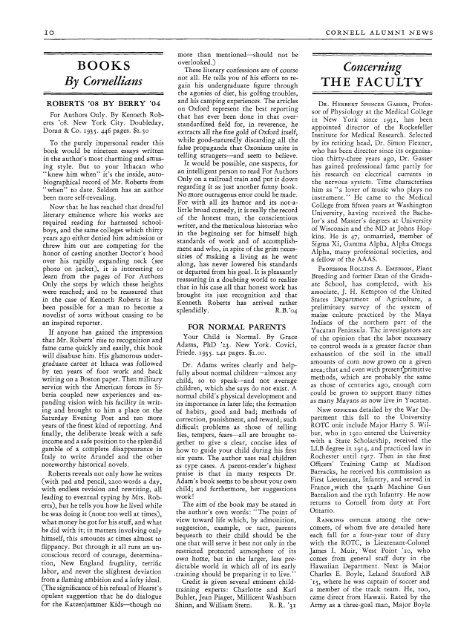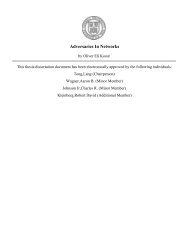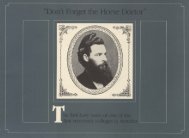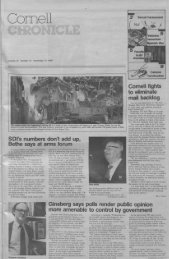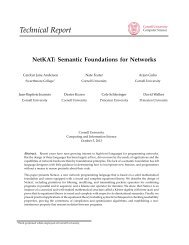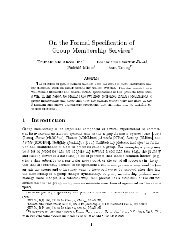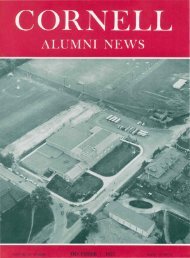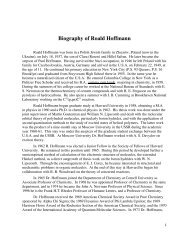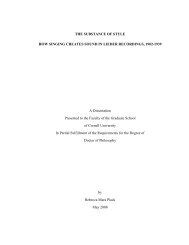ALUMNI NEWS - eCommons@Cornell - Cornell University
ALUMNI NEWS - eCommons@Cornell - Cornell University
ALUMNI NEWS - eCommons@Cornell - Cornell University
You also want an ePaper? Increase the reach of your titles
YUMPU automatically turns print PDFs into web optimized ePapers that Google loves.
IO CORNELL <strong>ALUMNI</strong> <strong>NEWS</strong><br />
BOOKS<br />
By <strong>Cornell</strong>ians<br />
ROBERTS '08 BY BERRY '04<br />
For Authors Only. By Kenneth Roberts<br />
Ό8. New York City. Doubleday,<br />
Doran & Co. 1935. 446 pages. $1.50<br />
To the purely impersonal reader this<br />
book would be nineteen essays written<br />
in the author's most charming and amusing<br />
style. But to your Ithacan who<br />
"knew him when" it's the inside, autobiographical<br />
record of Mr. Roberts from<br />
"when" to date. Seldom has an author<br />
been more self-revealing.<br />
Now that he has reached that dreadful<br />
literary eminence where his works are<br />
required reading for harrassed schoolboys,<br />
and the same colleges which thirty<br />
years ago either denied him admission or<br />
threw him out are competing for the<br />
honor of casting another Doctor's hood<br />
over his rapidly expanding neck (see<br />
photo on jacket), it is interesting to<br />
learn from the pages of For Authors<br />
Only the steps by which these heights<br />
were reached; and to be reassured that<br />
in the case of Kenneth Roberts it has<br />
been possible for a man to become a<br />
novelist of sorts without ceasing to be<br />
an inspired reporter.<br />
If anyone has gained the impression<br />
that Mr. Roberts' rise to recognition and<br />
fame came quickly and easily, this book<br />
will disabuse him. His glamorous undergraduate<br />
career at Ithaca was followed<br />
by ten years of foot work and hack<br />
writing on a Boston paper. Then military<br />
service with the American forces in Siberia<br />
coupled new experiences and expanding<br />
vision with his facility in writing<br />
and brought to him a place on the<br />
Saturday Evening Post and ten more<br />
years of the finest kind of reporting. And<br />
finally, the deliberate break with a safe<br />
income and a safe position to the splendid<br />
gamble of a complete disappearance in<br />
Italy to write Arundel and the other<br />
noteworthy historical novels.<br />
Roberts reveals not only how he writes<br />
(with pad and pencil, 2.Z00 words a day,<br />
with endless revision and rewriting, all<br />
leading to eventual typing by Mrs. Roberts),<br />
but he tells you how he lived while<br />
he was doing it (none too well at times),<br />
what money he got for his stuff, and what<br />
he did with it; in matters involving only<br />
himself, this amounts at times almost to<br />
flippancy. But through it all runs an unconscious<br />
record of courage, determination,<br />
New England frugality, terrific<br />
labor, and never the slightest deviation<br />
from a flaming ambition and a lokγ ideal.<br />
(The significance of his refusal of Hearst's<br />
opulent suggestion that he do dialogue<br />
for the Katzenjammer Kids—though no<br />
more than mentioned—should not be<br />
overlooked.)<br />
These literary confessions are of course<br />
not all. He tells you of his efforts to regain<br />
his undergraduate figure through<br />
the agonies of diet, his golfing troubles,<br />
and his camping experiences. The articles<br />
on Oxford represent the best reporting<br />
that has ever been done in that overstandardized<br />
field for, in reverence, he<br />
extracts all the fine gold of Oxford itself,<br />
while good-naturedly discarding all the<br />
false propaganda that Oxonians unite in<br />
telling strangers—and seem to believe.<br />
It would be possible, one suspects, for<br />
an intelligent person to read For Authors<br />
Only on a railroad train and put it down<br />
regarding it as just another funny book.<br />
No more outrageous error could be made.<br />
For with all its humor and its not-alittle<br />
broad comedy, it is really the record<br />
of the honest man, the conscientious<br />
writer, and the meticulous historian who<br />
in the beginning set for himself high<br />
standards of work and of accomplishment<br />
and who, in spite of the grim necessities<br />
of making a living as he went<br />
along, has never lowered his standards<br />
or departed from his goal. It is pleasantly<br />
reassuring in a doubting world to realize<br />
that in his case all that honest work has<br />
brought its just recognition and that<br />
Kenneth Roberts has arrived rather<br />
splendidly. R.B/04<br />
FOR NORMAL PARENTS<br />
Your Child is Normal. By Grace<br />
Adams, PhD '2.3. New York. Covici,<br />
Friede. 1935. 141 pages. $z.oo.<br />
Dr. Adams writes clearly and helpfully<br />
about normal children—almost any<br />
child, so to speak—and not average<br />
children, which she says do not exist. A<br />
normal child's physical development and<br />
its importance in later life; the formation<br />
of habits, good and bad; methods of<br />
correction, punishment, and reward; such<br />
difficult problems as those of telling<br />
lies, tempers, fears—all are brought together<br />
to give a clear, concise idea of<br />
how to guide your child during his first<br />
six years. The author uses real children<br />
as type cases. A parent-reader's highest<br />
praise is that in many respects Dr.<br />
Adam's book seems to be about your own<br />
child; and furthermore, her suggestions<br />
work!<br />
The aim of the book may be stated in<br />
the author's own words: "The point of<br />
view toward life which, by admonition,<br />
suggestion, example, or tact, parents<br />
bequeath to their child should be the<br />
one that will serve it best not only in the<br />
restricted protected atmosphere of its<br />
own home, but in the larger, less predictable<br />
world in which all of its early<br />
.training should be preparing it to live."<br />
Credit is given several eminent childtraining<br />
experts: Charlotte and Karl<br />
Buhler, Jean Piaget, Millicent Washburn<br />
Shinn, and William Stern. R. R. '31<br />
Concerning<br />
THE FACULTY<br />
DR. HERBERT SPENCER GASSER, Professor<br />
of Physiology at the Medical College<br />
in New York since 1931, has been<br />
appointed director of the Rockefeller<br />
Institute for Medical Research. Selected<br />
by its retiring head, Dr. Simon Flexner,<br />
who has been director since its organization<br />
thirty-three years ago, Dr. Gasser<br />
has gained professional fame partly for<br />
his research on electrical currents in<br />
the nervous system. Time characterises<br />
him as " a lover of music who plays no<br />
instrument." He came to the Medical<br />
College from fifteen years at Washington<br />
<strong>University</strong>, having received the Bachelor's<br />
and Master's degrees at <strong>University</strong><br />
of Wisconsin and the MD at Johns Hopkins.<br />
He is 47, unmarried, member of<br />
Sigma Xi, Gamma Alpha, Alpha Omega<br />
Alpha, many professional societies, and<br />
a fellow of the A A AS.<br />
PROFESSOR ROLLINS A. EMERSON, Plant<br />
Breeding and former Dean of the Graduate<br />
School, has completed, with his<br />
associate, J. H. Kempton of the United<br />
States Department of Agriculture, a<br />
preliminary survey of the system of<br />
maize culture practiced by the Maya<br />
Indians of the northern part of the<br />
Yucatan Peninsula. The investigators are<br />
of the opinion that the labor necessary<br />
to control weeds is a greater factor than<br />
exhaustion of the soil in the small<br />
amounts of corn now grown on a given<br />
area; that and even with presenφrimitive<br />
methods, which are probably the same<br />
as those of centuries ago, enough corn<br />
could be grown to support many times<br />
as many Mayans as now live in Yucatan.<br />
NEW OFFICERS detailed by the War Department<br />
this fall to the <strong>University</strong><br />
ROTC unit include Major Harry S. Wilbur,<br />
who in 1910 entered the <strong>University</strong><br />
with a State Scholarship, received the<br />
LLB degree in 1914, and practiced law in<br />
Rochester until 1917. Then in the first<br />
Officers' Training Camp at Madison<br />
Barracks, he received his commission as<br />
First Lieutenant, Infantry, and served in<br />
France % with the 314th Machine Gun<br />
Battalion and the 13th Infantry. He now<br />
returns to <strong>Cornell</strong> from duty at Fort<br />
Ontario.<br />
RANKING OFFICER among the newcomers,<br />
of whom five are detailed here<br />
each fall for a four-year tour of duty<br />
with the ROTC, is Lieutenant-Colonel<br />
James I. Muir, West Point Ίo, who<br />
comes from general staff duty in the<br />
Hawaiian Department. Next is Major<br />
Charles E. Boyle, Leland Stanford AB<br />
'15, where he was captain of soccer and<br />
a member of the track team. He, too,<br />
came direct from Hawaii. Rated by the<br />
Army as a three-goal man, Major Boyle


